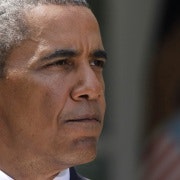To Russia with love: Obama's energy lever
Where did Vladimir Putin find $50 billion to spend on the Olympics in Sochi? Ask Ukraine, Germany and other overcharged Gazprom customers. Proceeds from Russia’s gas exports have emboldened Mr Putin’s foreign policy and helped underwrite the most lavish Winter Olympic pageant in history. There is no American counterpart to Gazprom. But the US energy revolution is a geopolitical windfall that will enable Washington to loosen Russia’s grip on its neighbours. It is the closest thing Barack Obama has to a game changer in what remains of his presidency.
The maths behind America’s shale revolution is unanswerable. The reserves opened up by hydraulic fracturing in the past five years have slashed US natural gas prices to $4 per million British thermal units. This is less than a third of the rate Gazprom charges most of its European customers for Russia’s pipelined gas. And it is well below a fifth of the rate in much of Asia, including China. US politics remains obsessed with whether Mr Obama will approve the Keystone XL pipeline from Canada.
But whichever way Mr Obama’s decision goes - my bet is he will postpone it for as long as possible - Canada’s tar oil is becoming irrelevant to America’s needs. The US has more than enough shale to be the new Saudi Arabia of natural gas, as well as being on course to overtake Saudi oil production by the end of the decade.
Investing in US shale gas is virtually a licence to print money: there is huge supply and unlimited demand. Last week the Obama administration approved its sixth terminal for LNG exports. The first, which is owned by Cheniere Energy, a Houston-based company, is due to start shipping to the UK, Spain and other countries in 2015. Dozens more are petitioning for export licences and clearances to build terminals. Even after including the costs of liquefaction and transport across the Atlantic, US gas prices will still be considerably lower than Russia’s at point of sale. There is also strong demand from India, which has a growing energy deficit, Japan, which closed down its nuclear industry after the Fukushima disaster, and Germany, which has also mothballed nuclear plants.
Once the ships start sailing, they will have a rolling impact on the global energy market. But Washington will first need to remove a number of self-imposed hurdles. First, the Obama administration is taking its own sweet time to approve LNG export licences.
Under American law, gas can only be exported to countries that have a free trade deal with the US. Exporters can get around this by showing they would not harm US national interests. But it is a cumbersome process. The sooner Washington updates its laws to permit a free market in energy, the quicker companies will invest in downstream infrastructure.
US law also bans the export of domestic crude oil - another vestige of a bygone era. More than 50 Republican and Democratic lawmakers are sponsoring a bill that would automatically permit liquefied natural gas exports to Nato countries. Passing that bill would be a start. But there are plenty of willing non-Nato customers that are ready to sign up, such as Ukraine and India.
Second, Mr Obama is doing his best to avoid showdowns with the protectionist and environmentalist lobbies. The first, led by Dow Chemical, says the US should keep lower gas prices to itself. This would boost the reshoring of US manufacturing by making it cheaper to produce at home.
The argument does not stand up to scrutiny. US manufacturers would continue to benefit from lower gas prices even if America scrapped all limits on exports - the gas would still be cheaper at source. Nor should their interests be overstated. Energy-intensive US manufacturing is a fraction of the size of the industrial energy sector. The latter is also far more jobs rich. In South and North Dakota, Ohio, Colorado and Texas, fracking has had broad knock-on effects on the labour market. In one fracking zone in Colorado, Wendy’s, the fast food outlet, is trying to lure new employees with $500 signing bonuses.
Environmentalists oppose fracking on pollution grounds. The process can contaminate the water supply, let off noxious gases and trigger seismic activity. Mr Obama is right to insist on tough safeguards even if they slow US production. But greens sometimes miss the wood from the trees. Last year natural gas overtook “King Coal” as the largest source of US electricity supply. It is the chief reason why US carbon emissions today are lower than they were in 2005. Helping India, China and others to lower their emissions would be a good thing.
Greens correctly point out that exporting the coal that is no longer consumed at home will have zero impact on climate change - it makes no difference where it is burnt. But they are wrong to oppose gas. It is the least bad mainstream option available.
Where does all this leave Mr Putin and his counterparts? It is well known - and long understood - that petro-autocracies tighten their grip on domestic politics when prices are high and are more willing to compromise when prices fall. The US now has the ability to put strong downward pressure on global energy prices and give its friends and allies an alternative supply line. The single biggest favour Mr Obama could do for the citizens of Russia and its neighbours would be to unleash the US energy revolution on the world. It is the kind of change almost everyone could believe in.
Copyright The Financial Times Limited 2014













